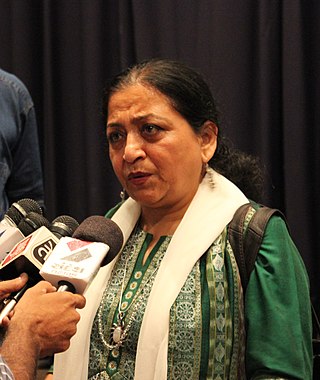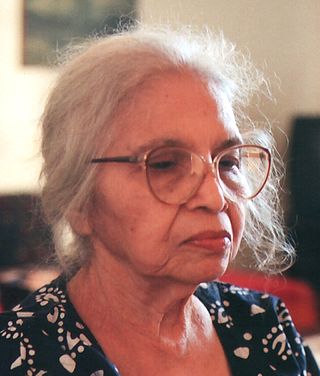
Madhu Purnima Kishwar is an Indian academic and a commentator. She is currently employed as a chair Professor in the Indian Council of Social Science Research. Kishwar along with fellow-academic Ruth Vanita co-founded the journal Manushi.
Amrita Basu is an American academic and political scientist. She currently is a professor at Amherst College where she holds affiliations in the departments of Political Science, Sexuality, Women's, & Gender Studies, Asian Languages & Civilizations, and Black Studies.

Indian Institute of Science Education and Research, Mohali is an autonomous public research university established in 2006 at Mohali, Punjab, India. It is one of the seven Indian Institutes of Science Education and Research (IISERs), established by the Ministry of Human Resources and Development, Government of India, to research in frontier areas of science and to provide science education at the undergraduate and postgraduate level. It was established after IISER Pune and IISER Kolkata and is recognized as an Institute of National Importance by the Government of India. Institute focuses on pure research as well as interdisciplinary research in various fields of science.

Chandigarh Capital Region (CCR) or Chandigarh Metropolitan Region (CMR) is an area, which includes the union territory city of Chandigarh, and its neighboring cities of Mohali, Kharar, Zirakpur, New Chandigarh (in Punjab) and Panchkula, Pinjore, Kalka, Barwala (in Haryana). Chandigarh Administration, Greater Mohali Area Development Authority (GMADA) and Haryana Urban Development Authority (HUDA) are different authorities responsible for development of this region. Baddi, an industrial town in nearby Himachal Pradesh, is also adjacent.

Angana P. Chatterji is an Indian anthropologist, activist, and feminist historian, whose research is closely related to her advocacy work and focuses mainly on India. She co-founded the International People's Tribunal on Human Rights and Justice in Kashmir and was a co-convener from April 2008 to December 2012.
Meera Nanda is an Indian writer and historian of science, who has authored several works critiquing the influence of Hindutva, postcolonialism and postmodernism on science, and the flourishing of pseudoscience and vedic science. In 2019–2020, she was a Guest Faculty in Humanities and Social Sciences at IISER Pune.

Kristen Rogheh Ghodsee is an American ethnographer and Professor of Russian and East European Studies at the University of Pennsylvania. She is primarily known for her ethnographic work on post-Communist Bulgaria as well as being a contributor to the field of postsocialist gender studies.

Leela Dube was a renowned anthropologist and feminist scholar, fondly called Leeladee by many. She had been married to the renowned anthropologist and sociologist LateShyama Charan Dube. Leela Dube was the younger sister of the late classical singer Sumati Mutatkar. Her elder son Late Mukul Dube was an avid photographer. She is survived by her younger son, Saurabh Dube. Known for her work on kinship and in women's studies, she wrote several books including Matriliny and Islam: religion and society in the Laccadives and Women and kinship: comparative perspectives on gender in South and South‑east Asia.
Somdatta Sinha is an Indian researcher and professor of biology, who is one of the earliest to start working in the area of theoretical biology in India. Her expertise is in the interdisciplinary fields of mathematical & computational biology, nonlinear dynamics and complex systems with a view to understand the logic and design of biological processes. She studies spatio-temporal organization in biological systems – from biological sequences to spread of disease in populations – using mathematical and computational methods. She has played a central role in the development of mathematical and computational biology in her country through research, organization of scientific meetings, training programs, conferences, and teaching interdisciplinary courses at the undergraduate and postgraduate levels. Her research encompasses patterns, interactions, and dynamics of biological systems using mathematical and physical methods to understand complex multi-scale biological systems. Sinha's research contributions focus on modelling a variety of biological systems, such as, circadian rhythms, pattern formation, biochemical pathways, synthetic biology, single and meta-population ecological models, epidemiology, and controlling spatiotemporal dynamics. She has also carried out computational analysis of genomes for classification of organisms using Chaos Game Representation (CGR) and Multi-fractal analysis, protein structure-function analysis using graph theory, and network analysis of large biochemical pathways. Her publications have made important contributions in the respective fields and are highly cited. Her seminal contribution to the development of the interdisciplinary field of Mathematical and Computational Biology in India was acknowledged by the Department of Biotechnology, Govt of India with the National Senior Woman Bioscientist Award in 2013 and the J C Bose National Fellowship from the Department of Science and Technology, Govt. of India. She is a fellow of the Indian National Science Academy, Indian Academy of Sciences and National Academy of Sciences. She was elected Fellow of the Wissenschaftskolleg zu Berlin for 2000-2001 and International Visiting Research Scholar at the Peter Wall Institute for Advanced Studies at the University of British Columbia, Vancouver, Canada in 2018. She has traveled widely across the globe and given many invited talks in universities and conferences.
Leith Patricia Mullings was a Jamaican-born author, anthropologist and professor. She was president of the American Anthropological Association from 2011–2013, and was a Distinguished Professor of Anthropology at the Graduate Center of the City University of New York. Mullings was involved in organizing for progressive social justice, racial equality and economic justice as one of the founding members of the Black Radical Congress and in her role as President of the AAA. Under her leadership, the American Anthropological Association took up the issue of academic labor rights.

Reema Nanavaty is an Indian developmental worker based in Ahmedabad, India. She has been active for three decades in organising women into co-operative organisations, enterprises and trade unions in India. She is the director of SEWA and is credited for building women's livelihoods and enterprises within eighteen states in India as well as in neighbouring countries such as Afghanistan, Sri Lanka, Nepal and Bhutan.
Entrepreneurial feminism, developed from social feminism, is a theory that explains how feminist values are enacted through the venture creation process to improve the position of women in society. Coined by Barbara Orser and Catherine Elliott, entrepreneurship is viewed as a mechanism to create economic self-sufficiency and equity-based outcomes for girls and women. Entrepreneurial feminists enter commercial markets to create wealth and social change, based on the ethics of cooperation, equality, and mutual respect.
Radhika Parmeswaran holds an endowed Herman B. Wells chair at Indiana University, Bloomington. A professor and former chair of journalism there, Parameswaran has published in leading journals, contributing to analysis of the ways in which colonialism, nationalism and globalization shape the social construction of modernity and gender.

Iris López is a contemporary professor, anthropologist, sociologist, and author, whose work focuses on feminist, Latino, and Latin American studies. She has one full-length book published, an ethnography about sterilization within female Puerto Rican populations, titled Matters of Choice. She received both her Masters and Doctoral degrees in Anthropology from Columbia University. Currently, López teaches sociology at the City College of New York, part of the City University of New York (CUNY), where she has been the Director of the Latin American and Latino Studies Program since 2016.
Kausik Chattopadhyay is an Indian structural biologist, protein biologist, and a professor at the Department of Biological Sciences. He was the Dean of R&D at the Indian Institute of Science Education and Research, Mohali until May 2021. He is known for his studies on the Pore-forming protein toxins and T-cell costimulatory molecules. The Department of Biotechnology of the Government of India awarded him the National Bioscience Award for Career Development, one of the highest Indian science awards, for his contributions to biosciences, in 2014.

Shareefa Hamid Ali, also known as Begum Hamid Ali, was an Indian feminist, nationalist, advocate, and political figure. She was the President of the All India Women's Conference in 1935, and one of the founding members of the United Nations Commission on the Status of Women in 1947.
Roxana Chu-Yee Ng (1951–2013) was an activist and scholar for fair migrant labour, gender and racial equality, and decolonising pedagogy. She is noted for her research on the garment industry in Canada and its relation to immigration, gender, race, and class, as well as her contributions to institutional ethnography, embodied learning and critical pedagogy.

Josephine Akosua Adomako Ampofo is a Ghanaian academic who is a professor of Gender Studies and African Studies at the University of Ghana. She is feminist activist-scholar, and a strong advocate for social justice.
Jyoti Puri is Hazel Dick Leonard Chair and Professor of Sociology at Simmons University. She is a leading feminist sociologist who advocates for transnational and postcolonial approaches to the study of gender, sexuality, state, nationalism, and death and migration. She has published three books, and her most recent book, Sexual States: Governance and the Struggle Against the Antisodomy Law in India’s Present received the Distinguished Book Award from the Sociology of Sexualities Section of the American Sociological Association. She has delivered keynote lectures and given talks across a wide range of universities in North America and Europe.
Mary McClintock Fulkerson is a Protestant theologian and scholar whose work explores feminist theologies and gender issues. She is currently a Professor Emerita of Theology at Duke Divinity School and an ordained minister in the Presbyterian Church (U.S.A.).








